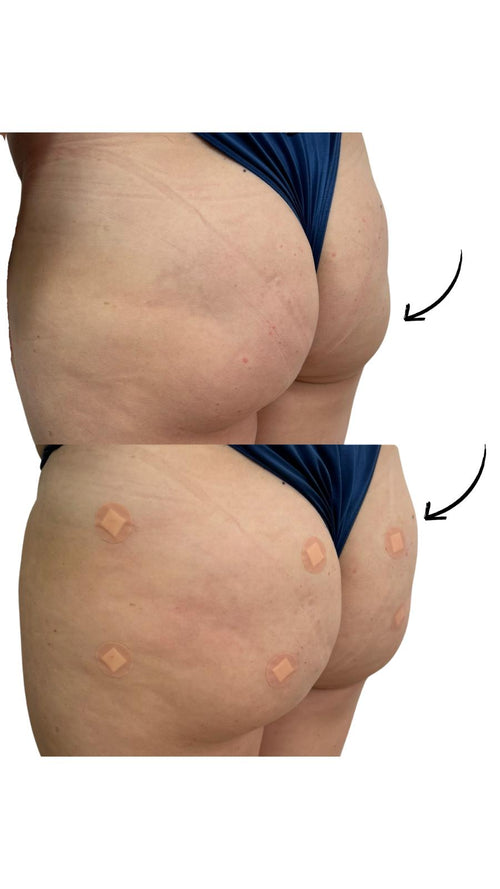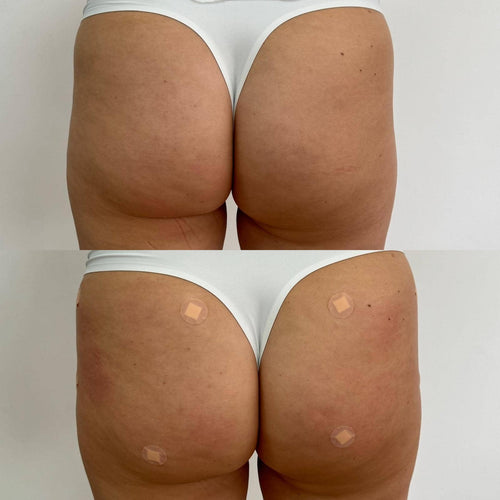Dr. Laura Geige’s expertise in Brazilian Butt Lift (BBL) procedures.
Bum filler injections, often referred to as “Brazilian Butt Lift (BBL) fillers,” are a non-surgical option for enhancing the shape and volume of the buttocks. They involve injecting dermal fillers, typically made from hyaluronic acid, into specific areas of the buttock to create a fuller, more sculpted appearance.
Unlike traditional BBL surgery, which involves transferring fat from one area of the body (usually the abdomen or thighs) to the buttocks, bum filler injections are a minimally invasive procedure. This means less downtime, minimal discomfort, and a faster recovery time.
The hyaluronic acid fillers used in bum filler injections work by attracting and retaining water molecules, which effectively plumps up the buttock area. These fillers are temporary, typically lasting between 6 to 18 months, depending on individual metabolism and lifestyle factors.
One of the key advantages of bum filler injections is that they offer a more immediate and noticeable result compared to traditional fat grafting in BBL surgery. The procedure also avoids the risks associated with surgical intervention, such as infection, bleeding, and scarring.
However, it’s important to note that bum filler injections are not a permanent solution. As the fillers gradually break down over time, the buttock volume will decrease. Therefore, patients may need to undergo repeat treatments to maintain their desired results.
It is crucial to consult with a qualified and experienced medical professional to determine if bum filler injections are suitable for you. They will assess your individual needs, discuss potential risks and benefits, and develop a customized treatment plan.
What They Are
Pros and Cons
Recovery and Results

A traditional Brazilian Butt Lift (BBL) is a surgical procedure that involves fat transfer to enhance the buttocks. This means removing fat from other areas of the body, typically the abdomen, thighs, or back, and injecting it into the buttocks to increase size and shape.
The surgery is performed under general anesthesia and takes several hours. The surgeon makes incisions in both the donor area (where fat is removed) and the recipient area (the buttocks). The harvested fat is then purified and injected into strategic locations in the buttocks to create a curvier, more shapely appearance.

Recovery from a BBL typically takes several weeks. Patients will experience some swelling, bruising, and discomfort for the first few days. It’s important to wear compression garments to minimize swelling and support the newly transferred fat.
During the initial recovery period, patients are advised to rest, avoid strenuous activity, and sleep on their stomach or side. Gradually, activities can be increased as tolerated, but it’s crucial to avoid high-impact exercise for at least six weeks.
The full results of a BBL become apparent after several months as the swelling subsides. Patients will notice a more defined and lifted buttock area with increased volume and projection. The transferred fat should integrate permanently into the buttocks, providing long-lasting results.
The Procedure Explained
Benefits and Drawbacks
Long-Term Considerations
Long-term considerations are crucial when deciding between bum filler injections and traditional Brazilian Butt Lift (BBL) surgery.
Here’s a breakdown:
Get Your Dermal Filler Consultation with Dr. Laura Geige
Bum Filler Injections
-
Longevity: Results typically last 6 months to 2 years, depending on the individual and the type of filler used.
-
Touch-ups: Regular maintenance appointments are necessary to maintain volume and achieve lasting results.
-
Risks: Potential complications include bruising, swelling, lumps, asymmetry, and infection.
Trust the experts for your Non-Surgical Brazilian Buttock Lift needs.
Traditional BBL
-
Longevity: Fat transfer is permanent, as the body integrates the transplanted fat.
-
Maintenance:** Minimal maintenance is required, although some touch-up procedures may be necessary if significant weight fluctuation occurs.
-
Risks: Higher risk of complications compared to fillers, including infection, fat embolism (fat entering the bloodstream), contour irregularities, and necrosis (tissue death).
Factors Affecting Long-Term Outcomes
*
Individual metabolism and body chemistry can influence the longevity of both procedures.
*
Lifestyle factors such as diet, exercise, and sun exposure can affect results.
*
Smoking can significantly increase the risk of complications and negatively impact healing.
Audrey’s JL Melissa Neufeld Create Cocktails at Home
- Why Are THC Beverages So Popular Among Millennials? - November 10, 2025
- What Is The Aftercare For A Liquid Facelift? - November 9, 2025
- What Age Can U Get Lip Filler - November 8, 2025
